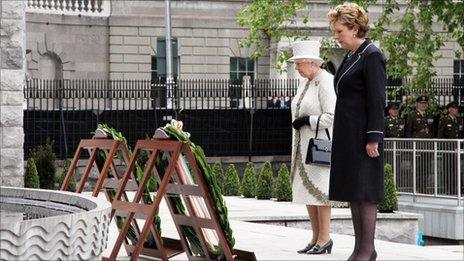The Queen, Symbolism and Sorrow
- Published
- comments

Queen Elizabeth II and President Mary McAleese lay wreaths at the Garden of Remembrance
"Hugely symbolic". Probably the two most over used words to describe the Queen's visit to the Irish Republic. I confess I myself have used the "s" word, and am struggling to find an alternative. Perhaps my struggle is evidence I lack the purple prose gene.
Or maybe it's part and parcel of a deliberately creative ambiguity fostered by both London and Dublin in which the spectator is invited to read whatever he or she wants into a President and a Queen standing, heads bowed, before the undeniably impressive Children of Lir statue at Dublin's Garden of Remembrance.
At a briefing given by the Foreign Secretary William Hague and the Irish Foreign Minister Eamon Gilmore, Channel Four's Gary Gibbon invited the politicians to share the interpretation that the joint appearance at the Garden was "a moment of contrition".
However the ministers weren't going there - it was "a hugely significant event", full of "huge symbolism" and an "important statement about our history and our future". But "contrition"? Well that would be in the eye of the beholder.
I asked the Foreign Secretary if it would be appropriate for the Queen to apologise for past British misdeeds in Ireland when she addresses guests at tomorrow night's state banquet. Mr Hague responded that Britain and Ireland weren't "glossing over the past".
This visit was about recognising the events of the past and showing how both states were moving together into the future. "That's the way to treat it rather than talking about apologies", Mr Hague concluded.
So - if that's anything to go by - expect a carefully crafted speech but something which stops short of a direct apology. Mr Hague also avoided any promises on issues like revealing official records on the Dublin Monaghan bombings.
It's something he says he's prepared to discuss, but he cited legal difficulties and constraints under the European Convention on Human Rights.
Both governments are much keener to talk about the future - the potential for further trade between partners who already do business worth one billion Euros a week.
Eamon Gilmore went so far as to suggest that the visit will put not just the history of the troubles in the past, but show Ireland was moving on from its "recent economic history" and rebuilding its reputation. Nice thought, although it's maybe a bit optimistic to talk about the crash as history just yet.
Both governments will be pleased that the Gardai were able to contain the inevitable protests - and that the visit has made the requisite visual impact.
In the sweep of British and Irish history, it is "hugely symbolic", it does underline the progress that has been made in Northern Ireland and the shared hopes for a brighter future.
Read more into it at your peril.